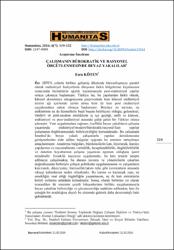| dc.contributor.author | Köten, Esra | |
| dc.date.accessioned | 2017-06-12T07:30:43Z | |
| dc.date.available | 2017-06-12T07:30:43Z | |
| dc.date.issued | 2016 | |
| dc.identifier.uri | https://hdl.handle.net/20.500.11776/1499 | |
| dc.description.abstract | 1970’li yıllarla birlikte gelişmiş ülkelerde küreselleşmeye paralel olarak endüstriyel faaliyetlerin dünyanın farklı bölgelerine kaymasının sonucunda hizmetlerin ağırlık kazanmasıyla post-endüstriyel yapılar ortaya çıkmaya başlamıştır. Türkiye ise, bu yapılardan farklı olarak, küresel ekonomiye entegrasyonu çerçevesinde hem küresel endüstriyel üretim ağı içerisinde yerini almış hem de bazı post endüstriyel uygulamalara sahne olmaya başlamıştır. Böylece ne tarımın, ne endüstrinin ne de hizmetlerin başlı başına belirleyici olduğu; geleneksel, modern ve post-modern niteliklerin iç içe geçtiği; milli ve küresel, endüstriyel ve post-endüstriyel arasında gidip gelen bir Türkiye ortaya çıkmıştır. Yeni uygulamalara rağmen, özellikle beyaz yakalıların çalışma yaşamında endüstriyel/modern/bürokratik/rasyonel/katı yapılar çalışmanın örgütlenmesinde belirleyiciliğini korumaktadır. Bu çalışmada İstanbul’da beyaz yakalı çalışanlarla yapılan derinlemesine görüşmelerden elde edilen bulgular ışığında bu zeminin tartışılması amaçlanmıştır. Araştırma bulguları, bürokrasilerin katı, hiyerarşik, kuralcı yapılarının ve rasyonalitenin verimlilik, hesaplanabilirlik, öngörülebilirlik ve denetim boyutlarının çalışma yaşamına egemen olduğuna işaret etmektedir. Esneklik taşıyıcısı uygulamalar, bu katı temele adapte edilmeye çalışılmakta; bu durum işveren ve yöneticilerin çıkarları doğrultusunda birbiriyle çelişen politikalar uygulanmasına ve çalışanların katı/esnek, dikey/yatay, bireysellik/takım ruhu gibi kavramların arasında sıkışıp kalmalarına neden olmaktadır. Bu karma ve karmaşık yapı, ne esnekliğin vaat ettiği özgürlüğün yaşanmasını, ne de katı sistemlerin belirli yollarını mümkün kılmaktadır. Sonuç olarak birbirine zıt olarak resmedilen iki sistemin çeşitli bileşenlerinin birlikte uygulanmasıyla beyaz yakalılar belirsizliğe ve güvencesizliğe mahkûm edilmekte, katı ile esneğin bir aradalığına dayalı bu sistemde giderek daha dezavantajlı hale gelmektedir. | en_US |
| dc.description.abstract | The emergence of the post-industrial structures can be attributed to the reallocation and the eventual shift of the industrial activity to a plethora of regions around the world which, itself, was a parallel development to the globalization of the 1970’s. Turkey, on the other hand, quite distinct from the above-mentioned structures, has witnessed various post-industrial practices as well as establishing herself in the overall world-wide production web within the framework of global economic integration. In consequence, a new Turkey has emerged where there is no observable dominance of agriculture, manufacturing or service industry; and furthermore, a perpetual ad-hoc medley of the notions such as traditional, post-industrial and nationalistic prevail. Despite the new practices, especially in the white-collar industry, the nature of the working life prevails due to established industrial / bureaucratic / modern / rational and rigid practices. This study, in light of the findings through in-depth interviews conducted with white-collar workers in Istanbul, aims at establishing and discussing the aforementioned platform. The study results lead us to conclude that the business arena is governed by rigid, hierarchical and prescriptive structures whereby the dimensions of rationality such as efficiency, calculability, predictability and control are compromised. While the more flexible new applications are subdued and hindered by the old established rigid structures, this apparently non-harmonized dual existence creates a conflicting environment between the employees and the employers who are driven by their own respective benefits. As a result, the white-collar worker is stuck in a conundrum of opposing concepts such as individuality vs. team spirit and flexible vs. rigid. This ill-defined unhealthy mixture of business practices neither fully procures the free environment promised by the flexibility nor the determined ways of the rigid systems. In conclusion, in a clash of seemingly opposing systems with disharmonious ingredients, the white –collar worker is becoming increasingly disadvantageous and condemned to a state of uncertainty and insecurity. | en_US |
| dc.language.iso | tur | en_US |
| dc.publisher | Namık Kemal Üniversitesi, Fen-Edebiyat Fakültesi | en_US |
| dc.rights | info:eu-repo/semantics/openAccess | en_US |
| dc.subject | Beyaz Yakalılar | en_US |
| dc.subject | Bürokrasi | en_US |
| dc.subject | Rasyonalite | en_US |
| dc.subject | Post-Endüstriyel | en_US |
| dc.subject | White-collars | en_US |
| dc.subject | Bureaucracy | en_US |
| dc.subject | Rationality | en_US |
| dc.subject | Post-industrial | en_US |
| dc.title | ÇALIŞMANIN BÜROKRATİK VE RASYONEL ÖRGÜTLENMESİNDE BEYAZ YAKALILAR | en_US |
| dc.title.alternative | WHITE-COLLARS IN THE BUREAUCRATIC AND RATIONAL ORGANIZATION OF WORK | en_US |
| dc.type | article | en_US |
| dc.relation.ispartof | HUMANITAS - Uluslararası Sosyal Bilimler Dergisi | en_US |
| dc.department | Tekirdağ Namık Kemal Üniversitesi Dergileri | en_US |
| dc.authorid | 129291 | en_US |
| dc.identifier.volume | 4 | en_US |
| dc.identifier.issue | 7 | en_US |
| dc.identifier.startpage | 319 | en_US |
| dc.identifier.endpage | 332 | en_US |
| dc.relation.publicationcategory | Makale - Ulusal Hakemli Dergi - Kurum Öğretim Elemanı | en_US |



















